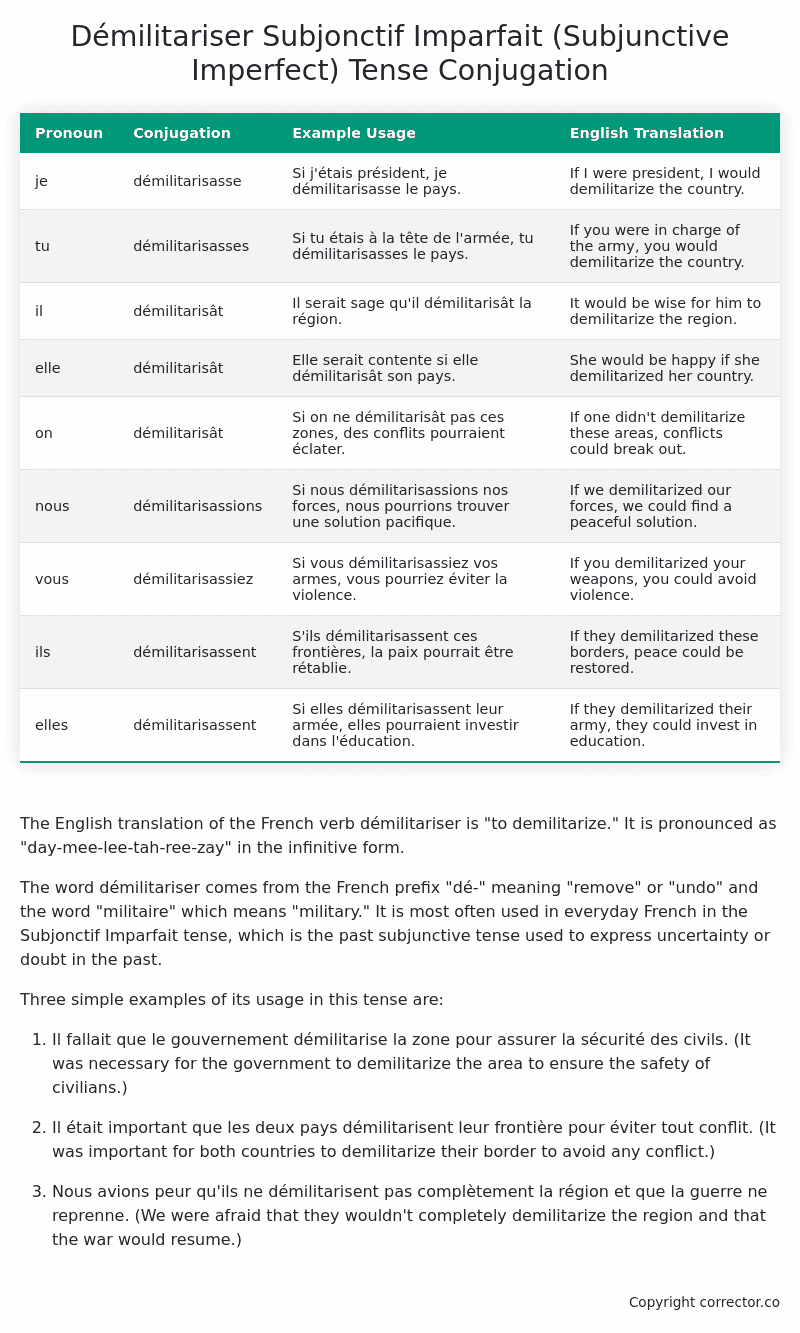Subjonctif Imparfait (Subjunctive Imperfect) Tense Conjugation of the French Verb démilitariser
Introduction to the verb démilitariser
The English translation of the French verb démilitariser is “to demilitarize.” It is pronounced as “day-mee-lee-tah-ree-zay” in the infinitive form.
The word démilitariser comes from the French prefix “dé-” meaning “remove” or “undo” and the word “militaire” which means “military.” It is most often used in everyday French in the Subjonctif Imparfait tense, which is the past subjunctive tense used to express uncertainty or doubt in the past.
Three simple examples of its usage in this tense are:
-
Il fallait que le gouvernement démilitarise la zone pour assurer la sécurité des civils. (It was necessary for the government to demilitarize the area to ensure the safety of civilians.)
-
Il était important que les deux pays démilitarisent leur frontière pour éviter tout conflit. (It was important for both countries to demilitarize their border to avoid any conflict.)
-
Nous avions peur qu’ils ne démilitarisent pas complètement la région et que la guerre ne reprenne. (We were afraid that they wouldn’t completely demilitarize the region and that the war would resume.)
Table of the Subjonctif Imparfait (Subjunctive Imperfect) Tense Conjugation of démilitariser
| Pronoun | Conjugation | Example Usage | English Translation |
|---|---|---|---|
| je | démilitarisasse | Si j’étais président, je démilitarisasse le pays. | If I were president, I would demilitarize the country. |
| tu | démilitarisasses | Si tu étais à la tête de l’armée, tu démilitarisasses le pays. | If you were in charge of the army, you would demilitarize the country. |
| il | démilitarisât | Il serait sage qu’il démilitarisât la région. | It would be wise for him to demilitarize the region. |
| elle | démilitarisât | Elle serait contente si elle démilitarisât son pays. | She would be happy if she demilitarized her country. |
| on | démilitarisât | Si on ne démilitarisât pas ces zones, des conflits pourraient éclater. | If one didn’t demilitarize these areas, conflicts could break out. |
| nous | démilitarisassions | Si nous démilitarisassions nos forces, nous pourrions trouver une solution pacifique. | If we demilitarized our forces, we could find a peaceful solution. |
| vous | démilitarisassiez | Si vous démilitarisassiez vos armes, vous pourriez éviter la violence. | If you demilitarized your weapons, you could avoid violence. |
| ils | démilitarisassent | S’ils démilitarisassent ces frontières, la paix pourrait être rétablie. | If they demilitarized these borders, peace could be restored. |
| elles | démilitarisassent | Si elles démilitarisassent leur armée, elles pourraient investir dans l’éducation. | If they demilitarized their army, they could invest in education. |
Other Conjugations for Démilitariser.
Le Present (Present Tense) Conjugation of the French Verb démilitariser
Imparfait (Imperfect) Tense Conjugation of the French Verb démilitariser
Passé Simple (Simple Past) Tense Conjugation of the French Verb démilitariser
Passé Composé (Present Perfect) Tense Conjugation of the French Verb démilitariser
Futur Simple (Simple Future) Tense Conjugation of the French Verb démilitariser
Futur Proche (Near Future) Tense Conjugation of the French Verb démilitariser
Plus-que-parfait (Pluperfect) Tense Conjugation of the French Verb démilitariser
Passé Antérieur (Past Anterior) Tense Conjugation of the French Verb démilitariser
Futur Antérieur (Future Anterior) Tense Conjugation of the French Verb démilitariser
Subjonctif Présent (Subjunctive Present) Tense Conjugation of the French Verb démilitariser
Subjonctif Passé (Subjunctive Past) Tense Conjugation of the French Verb démilitariser
Subjonctif Imparfait (Subjunctive Imperfect) Tense Conjugation of the French Verb démilitariser (this article)
Conditionnel Présent (Conditional Present) Tense Conjugation of the French Verb démilitariser
Conditionnel Passé (Conditional Past) Tense Conjugation of the French Verb démilitariser
L’impératif Présent (Imperative Present) Tense Conjugation of the French Verb démilitariser
L’infinitif Présent (Infinitive Present) Tense Conjugation of the French Verb démilitariser
Struggling with French verbs or the language in general? Why not use our free French Grammar Checker – no registration required!
Get a FREE Download Study Sheet of this Conjugation 🔥
Simply right click the image below, click “save image” and get your free reference for the démilitariser Subjonctif Imparfait tense conjugation!

Démilitariser – About the French Subjonctif Imparfait (Subjunctive Imperfect) Tense
Formation
Common Everyday Usage Patterns
Interactions with Other Tenses
Subjonctif Présent
Indicatif Passé Composé
Conditional
Conditional Perfect
Summary
I hope you enjoyed this article on the verb démilitariser. Still in a learning mood? Check out another TOTALLY random French verb conjugation!


